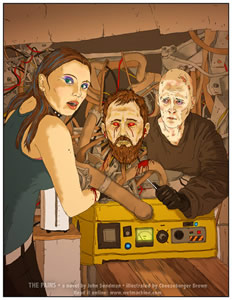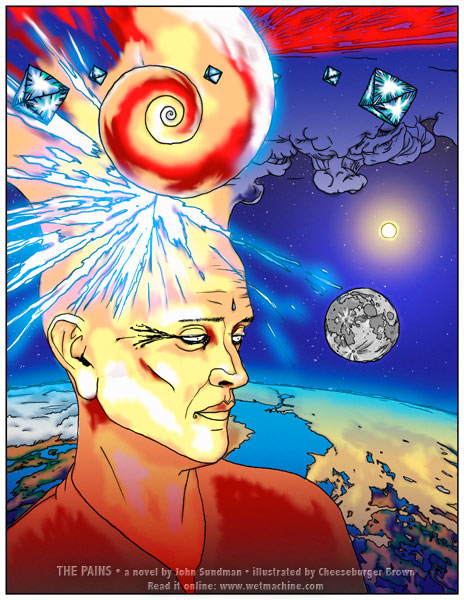Text Copyright John Sundman 2008
Illustrations Copyright 2005 by Cheeseburger Brown
Down, down, down. Stairway after stairway, some of wood, some of brick, some carved into the very granite. Down to the very foundations of the Monastery of St. Reinhold the Stonemason, down to the oldest part of the New Monastery that had been built, legend said, upon the ruins of the Church of the Martyr’s Chord.
Mr. Lux did not know the way from where they were to where they were going. Everything here was unfamiliar to him. But he had a sense that he was being attracted, in a strange way, to the chaotic machine, and a certain calm had come over him despite his pain. Xristi said, “He seems to know where he wants to go,” and nodded towards the bloody sack that she held with her left hand.
A song by Kate Bush had entered Mr. Lux’s head. It had been a favorite of his Nancy; he remembered now lying naked in a field with her, contemplating her freckled breasts. What would she make of his having shut himself away since her death in these wuthering, wuthering, wuthering heights?
It doesn’t hurt me
Do you want to feel how it feels?
Do you want to know that it doesn’t hurt me?
Do you want to hear about the deal that I’m making?
You, it’s you and me
And if I only could,
I’d make a deal with God,
And I’d get him to swap our places,
Be running up that road,
Be running up that hill,
Be running up that building
If I only could, oh…
They came around a corner and found themselves facing a door that was marked with carved graphittos, painted over but still clearly visible. Crudely drawn female shapes, a hand grasping some kind of rod, a flute . . . And above the door, carved in stone, Hortulus Virginae. They stopped, and somewhere far above them they heard echoes of people running. There were innumerable ways they could have gone, and it should have been easy for them to hide in this vast maze. But the blood, the blood. The trail was unmistakable. They needed to keep moving.
Mr. Lux grasped the heavy handle and pulled as hard as his weakened muscles could pull. It opened, and the sunlight assaulted their eyes as they stepped out into a tiny courtyard, overgrown with weeds and a few tired trees. On three sides the garden was walled in by towering brick and stone edifices, but the fourth side overlooked a cliff and offered a view of the distant city of New Kent, from which arose ten or fifteen black plumes of smoke, as if the whole city were afire. A gravel path led across the garden to another door into yet another wing of this unending building, and as they walked to it, Mr. Lux noticed, off to his right, three ancient-looking women in tattered robes who waved and smiled toothlessly. Xristi reached the door first, and as she reached out for the handle, Mr. Lux noticed that the burlap bag she was carrying seemed to be faintly glowing.
More stairs, more corridors, rats scurrying before them now, locusts flying in through unseen windows. The bleeding burlap bag grew ever brighter.
Finally, they arrived at Room 101. There, amid the discarded transformers, capacitors, resistors, diodes, vacuum tubes, lamps, wires, dials and sundry detritus from Aldred’s failed reformation sat Mr. Lux’s Systron-Donner chaos engine.
“We must connect him to it; it is our only hope,” Mr. Lux said.
“But what do we hope to gain by this?” Xristi said. “What will this technology bring us? Will we be less lonely? Will we connect? Will we feel that life is worthwhile?”
“If we can only get a little bit of divine guidance,” Norman Lux said. “Only the smallest hint of how we are to proceed. The tiniest taste of God’s grace, and we can do the rest ourselves, I’m sure of it.”
From the bag came two faint words: “The light!”
“OK,” Xristi said. “Let’s do it.” And she placed the bag on the floor and reached in for its contents.
Furiously they worked to make the connections. No words were necessary: it was obvious what needed to be done. The only question was whether they would have time.

Now the door bursts open, and in comes the abbot, enraged. He’s wearing a simple black cassock with a noosifix around his neck. He is sixty-five years old, an ex-athlete, very tall and still muscular. He raises his right hand high above his head — in it, Mr. Lux can see the razor tip of an impossibly sharpened stick. Mr. Lux contemplates that point. It is a single atom.
And here is Carson too. And Justice Scalia! And Templeton Cheney! And Monty Meekman! Like the devil, he takes on many shapes.
Xristi throws a switch, and Fred comes to life. His miraculous presence fills the room, and all turn and watch in wonder. And serenity is upon them. There is silence.
Which is broken by Fred singing, in a weak reedy tenor, a voice not unlike that of Leonard Cohen:
You who build these altars now
To sacrifice these children
You must not do it anymore
We are all in that room. Even Sundman, basculating on the brink of chaos, stuck in a deterministic worldview, trying to percolate information from one world into another. This is all just beyond his grasp. He almost has it. He really does. The self-similarity is astonishing.
Fred sings,
You who build these altars now
To sacrifice these children
You must not do it anymore
We zoom out.
We zoom out of Changes!, out of the Monastery; we see the Earth from above.
It is we who build these altars now
To sacrifice our children
We must not do it anymore
The people of Freemerica will have to decide. No godhead will save them now.
Do they want freedom? Do they want to enslave themselves? Do they love Big Brother? Does their lust for that tug blind them to what must be done?
And so Mr. Lux became light, but the darkness knew it not.
As Mr. Lux became eponymous, his probability function expanded. He became potential. Certain thoughts passed through him, and thus through Xristi, through me, and now through you. Thoughts which were trajectories on the Hebbian association–deformed surface of a unit hypersphere optimized for surface area. The Eagle found his own freedom on the seven-dimensional hypersphere. He did not need Lux, or anything other than his own thought, to become free. He thought himself out of Changes!
We need not chronicle the pains of our own lives. Each reader, each listener hears them in her or his own silent heart. It is our shared Freemerican pain that concerns us here.
A rat is upon the land, and dead ignorant religion deadens us. That rat has been wounded with a homemade shiv, and its head is frozen. But it is still dangerous.
None of that concerns Mr. Lux. He is stone free. It is our problem now.
Mr. Lux is now nowhere to be found, but light is everywhere. Xristi Friedman knows a freedom and joy she’s never known before. Something magical and good has happened.
At Changes! a change agent, about to sadistically smite the Eagle, becomes distracted by light and cosmic energy. Were there any windows in that prison, he could have looked out that window and witnessed the Miracle at the Monastery.
But hark! Now windows appear in the walls of the prison. They are barred with thick steel bars, that is true. But barred windows are an improvement over windowlessness. The person known as the Eagle, at this exact moment, becomes changed into a bird and flies free of the bars of Changes!
At the University of New Kent, a six-clasped door is open, and a vile liquid flows out into the hallway from the room behind. A smell of rotting flesh stinks up the joint.
Did Mr. Lux have The Pains? Assuredly so. Were they caused by chaotic connection to a soul gone bad? That is what the doctrine teaches us. Did the soul gone bad belong to Carson, the corrections officer (for that is what Mr. Lux himself thought)? No, Mr. Lux was wrong about that. For at the end, Carson did join the Party, of his own volition. Therefore his soul did go bad; he was not redeemed. And yet Mr. Lux escaped The Pains.
But whose soul then, was it that was about to go bad? Was it the abbot’s or Xristi’s, or Meekman’s or Mr. Agnolli’s? Was it Mr. Lux’s own soul that he saved? Did he escape the Pains by escaping from the strictures of the Society of Fred?
This is a matter of great debate among us theologians.
Personally, I think that it was the soul of Freemerica itself that Mr. Lux redeemed. But the redemption was not permanent — it lasted only a few short days. The Party is still with us. Oliver North still is on the telescreen.
It is up to each of us who suffers now these Pains, to look to the salvation of this ideal we love, Freemerica. Neither the Party’s doublethink, nor the Church’s sterile philosophy, can provide the answers. What is left then? Science? But there is no more science. And chaos? Chaos is intractable. This is our situation now.
Enough! Class dismissed for today.
We will resume tomorrow, in Lecture Hall 101. Father Chen will be lecturing on the New Liturgy of The Transcendent Painee, here at the Monastery of St. Norman.
This work is licensed under a Creative Commons Attribution-NonCommercial-NoDerivs 2.5 License.





